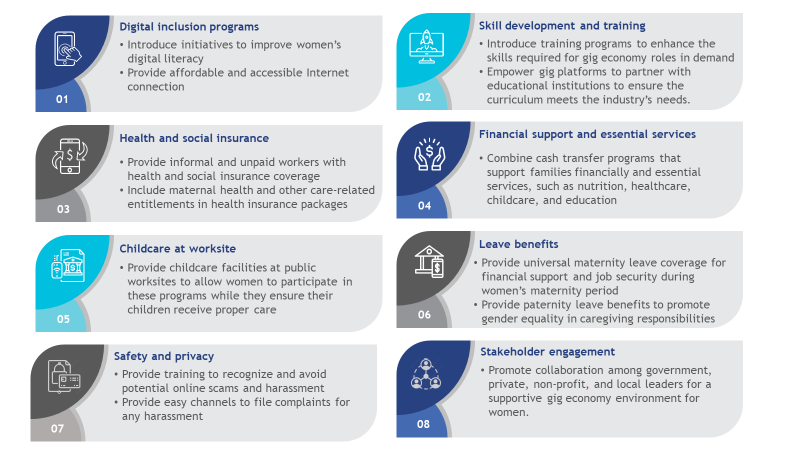Challenges and opportunities for Kenyan women from the gig economy in the digital age
 by Pauline Katunyo and Ritika Sah
by Pauline Katunyo and Ritika Sah Dec 15, 2023
Dec 15, 2023 5 min
5 min
The gig economy in Africa, notably Kenya, has grown at a 20% annual rate, with an expected 80 million gig workers by 2030. However, women’s participation remains low at 28% due to limited access to technology, societal norms, safety concerns, and a gender gap in digital skills. This blog explores the challenges Kenyan women face in the gig economy and proposes sustainable interventions to enhance their digital literacy and promote inclusive policies for a more equitable future of work.
Introduction
Jane, a freelance transcriber from Nairobi, Kenya, said, “I have a small kid and a husband, and I have to take care of them. My husband is also a freelance transcriber.
Jane is among the many gig workers who work in the informal gig economy across Africa. The gig economy and the “platformization” of labor have transformed Africa’s employment landscape. A Mastercard Foundation study revealed that Africa’s gig economy has been growing at an average annual rate of 20% and is expected to reach 80 million gig workers by 2030.
However, evidence from a recent study of 314 online gig workers revealed that the participation of female workers in Kenya’s gig economy remains low at 28%. Other studies on gig workers in Kenya and elsewhere concluded that about 60% of gig workers in these countries were men. The studies also revealed that women were more likely to exit the gig economy. This is mainly attributed to societal norms, working conditions, and occupational barriers, which limit their participation in gig work.
This blog explores the gig economy’s significance for Kenyan women. It explains how the gig economy offers them flexibility and economic empowerment. It also provides concrete interventions and approaches to address the digital skills gap that hinders many women’s participation in this evolving job market.
Can we rewrite this as “So, if both of us transcribe, he has more time to work and concentrate than me.” addressed.
Kenya’s gig economy landscape
Kenya’s gig economy has rapidly expanded due to the emergence of digital work platforms. These platforms have transformed how people work and created alternative economic opportunities. A study by Mercy Corps anticipated the online gig economy to grow at an annual rate of 33% and be valued at USD 345 million in 2023. By the end of 2022, about 1.9 million people were already engaged in online gig work and digitally-enabled jobs, up from 638,000 in 2019, per the MCF-KEPSA report, 2022. The World Bank projects that Kenya’s digital economy is expected to grow to USD 23 billion by 2025 and create thousands of new jobs.
Kenya hosts various gig platforms, which range from Upwork and Fiverr to local players, such as the Ajira Digital program. As per the Kenya Private Sector Alliance (KEPSA) 2020 study, 1.2 million Kenyan adults now engage in gig work, particularly in the tech industry. Platforms, such as Uber, Lyft, Grubhub, DoorDash, and Fiverr, have become essential for gig workers. Hence, the present and future of work in Kenya will involve workers who participate in various gig-work activities with different levels of formality and high flexibility.
Challenges for Kenyan women in the gig economy
As Kenya continues to embrace the gig economy through a flexible and dynamic platform for different job opportunities, women face unique challenges that significantly impact how well they participate in this evolving landscape. We have identified the different challenges Kenyan women face in the gig economy below:
-
- Limited access to technology: The GSMA report highlights a 38% gender gap in mobile Internet use. 54% of women who lack mobile devices cite affordability as the primary barrier. Many gig opportunities rely on digital platforms, but a gender-based digital divide persists due to women’s limited access to smartphones, unreliable Internet, and affordability issues. This limits how well they can integrate into online gig platforms and hinders their participation in the digital workforce.
-
- Societal norms and cultural barriers: Deep-rooted societal norms and cultural expectations often restrict Kenyan women’s choices of gigs. Traditional gender roles may discourage women’s participation in certain types of work deemed more suitable for men. This limits the diversity of opportunities available to them. MSC’s research in Kenya highlights that women were more involved in traditionally female-oriented jobs, such as hairdressing, beauty services, and housekeeping. Women take up these roles because of their familiarity with the line of work, their risk-averse nature, and societal norms. Men in the gig economy were more involved in jobs, such as delivery, construction, driving, and home repairs.
-
- Safety concerns: Women in the gig economy are more concerned about their physical and online safety. Some gig jobs require female workers to meet clients or work in unfamiliar locations, which exposes them to potential risks. Moreover, online platforms may lack adequate mechanisms to address harassment and discrimination, which further compromises female gig workers’ safety. The threat of sexual harassment is high in situations where the gig requires face-to-face interaction.
-
- Lack of social protection: Gig workers often lack the traditional employment benefits and social protection enjoyed by formal sector workers. This absence of a safety net is particularly challenging for women who may face additional vulnerabilities. Per the World Bank, women’s labor force participation in Kenya in 2022 was 74%, but women were paid 32% less than men on average. The lack of maternity benefits, healthcare coverage, and pension plans puts women at a disadvantage and impacts their long-term financial security.
The gender gap in digital skills: The lack of digital skills is a major obstacle to Kenya’s economic progress. It hinders businesses’ competitiveness and productivity because businesses lack workers with the necessary tech skills to meet the digital economy’s demands. This gap is particularly pronounced, as only 35% of women use advanced digital services compared to 54% of men.
The government and digital platforms must address the challenges Kenyan women face in the gig economy to ensure an inclusive and equitable future of work. With the gig economy’s growth, policies and initiatives that promote digital inclusion, dismantle gender stereotypes, and establish fair labor practices must be implemented. Kenya can harness the full potential of its 49.7% female workforce if it shapes a technologically advanced, socially just, and inclusive future of work. The challenges women face in the gig economy need to be resolved to unlock the nation’s full economic potential.
Sustainable support for Kenyan women in the gig economy
Sustainable interventions for women in Kenya’s gig economy can focus on several key areas that enhance their digital literacy and access to technology and enable them to navigate online platforms effectively. Targeted skill development programs that cater to the gig industry’s demands can empower women to diversify their opportunities and increase their income. Moreover, the promotion of inclusive policies and fair labor practices can create a more equitable and secure environment for Kenyan women in the gig economy. The following figure details MSC’s recommendations that provide such sustainable interventions.
Figure 1: High-level recommendations that provide sustainable interventions for Kenyan women in the gig economy
Conclusion
Many Kenyan women and girls are not fully engaged in gig work despite the opportunities in the gig economy. As work transitions online, gender-based factors are likely to exclude women and girls from the job market. The government and other stakeholders must promote gender inclusivity through relevant affirmative policies. They must strengthen current labor laws and regulations around social protection, equal employment opportunities, and labor standards for gig workers.
Awareness of women’s experiences on digital labor platforms in multiple sectors of the economy can build evidence of the emerging opportunities to ensure decent working conditions. Policymakers and platform companies should play a central role to provide high-quality work. They must also improve economic security, support unpaid work, increase worker’s control over schedules, ensure their safety, and base policy and practice on worker preferences, which requires collective action.
Please also see MSC’s previous work on women in the gig economy, which offers insights, solutions, and recommendations to promote gender inclusivity in the gig economy.



Leave comments